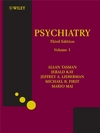Dissociative Disorders
Summary
The dissociative disorders consist of a cluster of disorders that involve incomplete ability to integrate various aspects of identity, memory, preception, and consciousness. Conceptually, these disorders represent abnormal responses to traumatic experiences, and are the result of undue stress on the brain's capacity to integrate components of traumatic events. The disorders reviewed include classically designated DSM dissociative disorders, such as dissociative amnesia, dissociative fugue, dissociative identity disorder, and depersonalization disorder; as well as other disorders in which dissociative defenses represent the major operating principle, such as acute stress disorder and dissociative trance disorder. We will review the various types of pharmacological and psychotherapeutic approaches that serve as the basis for treatment.



